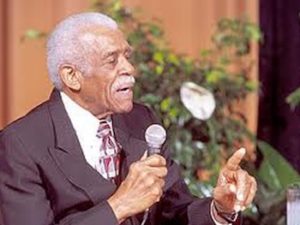
Donald Hollowell
*The birth of Donald Hollowell on this date in 1917 is marked. He was a Black attorney who specialized in Civil Rights.
From Wichita, (Sedgwick County) Kansas, Donald Lee Hollowell was the third of five children born to Ocenia and Harrison Hollowell. His mother encouraged all her children to get a good education, and each played a musical instrument. Hollowell played the tuba and sousaphone in the school band and was an excellent athlete. Hollowell was introduced to racial prejudice at a young age. The systematic discrimination accelerated as he grew older to find work and secure a better life for their children, and his family moved often.
During 1935, the summer of his senior year in high school, and during the Great Depression, Hollowell's father told him he would have to quit school and support himself with a full-time job. Furious with the economic situation, he joined the U.S. Army's 10th Cavalry Regiment (the Buffalo Soldiers) at Fort Leavenworth. By 1938, as a PFC Specialist Five, he received a chance to attend Lane College in Jackson, Tennessee. There, he played football, basketball, and track and field. Hollowell became class president, helped establish their Kappa Alpha Psi Chapter, and joined the C. M. E. (Christian Methodist Episcopal) Church.
In 1941, Hollowell was recalled to active duty with a segregated U.S. Army for WWII. Hollowell eventually arrived at Fort Benning, Georgia, where he met and married Louise Thornton, who owned a beauty salon in Atlanta. The couple married in May 1943, a few months before Hollowell re-enlisted and was transferred overseas. After the war, he returned to Lane College and graduated magna cum laude in 1947. He went on to earn a law degree from Loyola University in Chicago in 1951. Hollowell became a lawyer to help others achieve social justice because of his experiences with racism and his work with the Southern Negro Youth Conference at Lane.
He moved to Atlanta and opened a law practice (Hollowell, Foster & Gepp). He became one of the leading Civil Rights attorneys in the country, mentoring a host of young Black attorneys, including Vernon Jordan and Horace Ward. In 1966, Hollowell accepted an appointment from President Lyndon B. Johnson as the first regional director of the new Equal Opportunity Commission, which monitors workplace discrimination. He remained at the EEOC as a regional attorney until 1985 and was later considered for a federal or state judgeship, although no nomination came.
Throughout his career, he was regarded as one of the preeminent Civil Rights attorneys in the South, consistently at the center of historical events. Hollowell's work and contributions to the movement during the 1950s through 1960s as an attorney changed the face of history throughout Georgia and changed the lives of its people. Hollowell was closely associated with two pivotal Georgia Civil Rights cases, the integration of Atlanta Public Schools and the University of Georgia (1961). Still, for 40 years, he was a quiet leader in Georgia's battle for Civil Rights.
His legacy also includes desegregating buses in Augusta and schools in Macon and freeing Dr. Martin Luther King, Jr. from Reidsville Prison in the 1960s, where he landed following a traffic offense. When Grady Memorial Hospital in Atlanta refused to allow Black doctors to work in the hospital, Hollowell argued and won the Civil Rights case that had a national impact. His success is credited to his hard work, integrity, and unique abilities to understand the law and race relations. In 1998, Atlanta renamed Bankhead Highway in his honor.
Donald Hollowell died in Atlanta on Dec. 27, 2004, at age 87, from heart failure. Following his death, Lane College honored him posthumously with the Order of the Dragon, the third person to receive the honor. Lane College also planned to name its library in his honor.